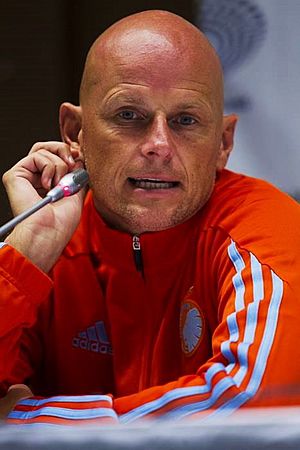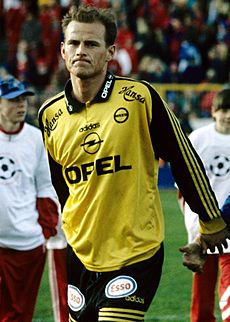Ståle Solbakken facts for kids

Solbakken as manager of Copenhagen in 2014
|
|||
| Personal information | |||
|---|---|---|---|
| Full name | Ståle Solbakken | ||
| Date of birth | 27 February 1968 | ||
| Place of birth | Kongsvinger, Norway | ||
| Height | 1.90 m (6 ft 3 in) | ||
| Position(s) | Midfielder | ||
| Team information | |||
|
Current team
|
Norway (head coach) | ||
| Youth career | |||
| –1989 | Grue | ||
| Senior career* | |||
| Years | Team | Apps | (Gls) |
| 1989–1994 | Hamarkameratene | 100 | (35) |
| 1994–1997 | Lillestrøm | 99 | (34) |
| 1997–1998 | Wimbledon | 6 | (1) |
| 1998–2000 | AaB | 79 | (13) |
| 2000–2001 | Copenhagen | 14 | (4) |
| Total | 298 | (87) | |
| International career | |||
| 1992 | Norway U21 | 2 | (0) |
| 1994–2000 | Norway | 58 | (9) |
| Managerial career | |||
| 2002–2005 | Hamarkameratene | ||
| 2006–2011 | Copenhagen | ||
| 2011–2012 | 1. FC Köln | ||
| 2012–2013 | Wolverhampton Wanderers | ||
| 2013–2020 | Copenhagen | ||
| 2020– | Norway | ||
| *Club domestic league appearances and goals | |||
Ståle Solbakken (born on February 27, 1968) is a Norwegian football manager and former player. He is currently the head coach of the Norway national team.
As a player, Solbakken was a talented midfielder. He was named the best Norwegian midfielder in 1995. He also won the Danish Superliga championship with two different clubs: Aalborg and Copenhagen. He played 58 games for the Norway national football team, scoring nine goals. He represented Norway in the 1998 FIFA World Cup and the UEFA Euro 2000 tournaments. His playing career ended in March 2001 due to a serious health issue.
As a manager, Solbakken has also achieved great success. He was named the Norwegian Manager of the Year in 2004. He won eight Superliga championships with Copenhagen. He also managed German club 1. FC Köln and English side Wolverhampton Wanderers. Since 2020, he has been coaching the Norwegian national team.
Contents
Playing Career Highlights
Starting in Norway
Solbakken began his football journey in Norway. He played for his local team, Grue, in the lower leagues. After five seasons, he moved to HamKam in 1989. At that time, HamKam was in the second division.
He became the top goalscorer for HamKam in 1990, scoring nine goals. The next season, he scored 14 goals, helping the team get promoted to the top league, the Norwegian Premier League. HamKam finished fifth in 1993, which was their best result in many years.
Success with Lillestrøm

In 1994, Solbakken joined Lillestrøm, another top-league team. In his first season, the club finished second in the league. Even though Lillestrøm finished fourth the next year, Solbakken's excellent playing earned him the Kniksen award as the best Norwegian Midfielder of the Season in 1995.
He became the captain of Lillestrøm. He helped the team finish second again in 1996. He played one more season for them in 1997. Overall, he played 99 league games for Lillestrøm and scored 34 goals.
Playing Abroad
In October 1997, Solbakken moved to England to play for English Premier League club Wimbledon. He played six league games and scored one goal against West Ham United. He was even named "man of the match" twice. However, he had disagreements with the team manager and soon left the club.
He quickly moved to Denmark in March 1998, joining Aalborg. Solbakken became Aalborg's captain. He led the club to win the 1998–99 Danish Superliga championship. They also reached the final of the 1998–99 Danish Cup. In 2000, he won the Danish Football Player of the Year Award. He played 79 games and scored 13 goals for AaB in the Danish Superliga.
In August 2000, he joined another Danish team, Copenhagen. Solbakken quickly became a key player. He helped push the team to the top of the league. However, he could not finish the season due to a serious health issue in March 2001. Copenhagen went on to win the 2001 Superliga championship, giving Solbakken another winner's medal.
Health Challenges
During a training session on March 13, 2001, Solbakken had a heart attack. The club doctor, Frank Odgaard, quickly helped him. Solbakken's heart had stopped beating. The doctor performed cardiac massage until an ambulance arrived. He was considered clinically dead at the scene. On the way to the hospital, he was revived about seven minutes later.
He recovered from this serious event and now has a pacemaker to help his heart. The heart attack was caused by a heart problem that no one knew about before. Soon after, following medical advice, he announced that he would stop playing football professionally.
International Career
Solbakken played his first international game for the Norway national football team on March 9, 1994. It was a friendly match against Wales, which Norway won 3–1. Even though he was not in the squad for the 1994 FIFA World Cup, he became a regular player for Norway soon after.
He was part of the Norwegian team that qualified for the 1998 FIFA World Cup. He played in two group games against Morocco and Scotland. Norway was knocked out in the second round by Italy.
Norway also qualified for the next big tournament, UEFA Euro 2000. Solbakken got an injury just before the finals. He only played in one game during the tournament, a goalless draw with Slovenia. This result meant Norway was eliminated from the group stage. After this, he decided to retire from international football at age 32.
In total, he played 58 games for Norway and scored nine goals.
International Goals
Here are the goals Solbakken scored for the Norway national team:
| No. | Date | Opponent | Score | Result | Venue | Competition |
|---|---|---|---|---|---|---|
| 1. | 2 June 1996 | 1–0 | 5–0 | Ullevaal, Oslo | 1998 World Cup qualifier | |
| 2. | 3–0 | |||||
| 3. | 1 September 1996 | 1–0 | 1–0 | Ullevaal, Oslo | Friendly | |
| 4. | 29 March 1997 | 4–1 | 4–1 | Sharjah Stadium, Sharjah | Friendly | |
| 5. | 20 August 1997 | 1–0 | 4–0 | Olympic Stadium, Helsinki | 1998 World Cup qualifier | |
| 6. | 10 September 1997 | 2–0 | 5–0 | Ullevaal, Oslo | 1998 World Cup qualifier | |
| 7. | 6 September 1998 | 1–1 | 1–3 | Ullevaal, Oslo | Euro 2000 qualifier | |
| 8. | 22 January 1999 | 1–0 | 3–3 | Municipal Stadium, Umm al-Fahm | Friendly | |
| 9. | 29 March 2000 | 1–0 | 2–2 | Cornaredo Stadium, Lugano | Friendly |
Managerial Career
Starting with Ham-Kam
In 2002, Solbakken went back to Norway. He started his coaching career at his old club, HamKam, which was in the second division. He was very successful there. The club won the league and was promoted to the top-flight Tippeligaen. Because of his recovery and HamKam's promotion, he was sometimes called "Ståle Salvatore" (Ståle the Savior) in the Norwegian news.
The next season, Solbakken led HamKam to a fifth-place finish in the Tippeligaen 2004 season. He won the 2004 Kniksen award as the Norwegian Manager of the Year. In late 2005, Solbakken was chosen as the new manager for another of his former clubs, Copenhagen.
Leading Copenhagen
In his first years at Copenhagen, Solbakken guided the team to win the 2006 and 2007 Danish Superliga championships. They also won the 2006 Royal League trophy. He led Copenhagen to the group stage of the 2006–07 UEFA Champions League. They beat Ajax to get there. Copenhagen finished last in their group, but they had a great 1–0 victory against Manchester United.
In May 2009, Solbakken led Copenhagen to win both the 2009 Danish Cup and the 2009 Superliga championship. This was the club's seventh championship. On November 3, 2009, it was announced that he would not continue his contract after June 30, 2011. He had planned to become the Norway national team manager later, but this plan did not happen.
Time in Germany and England
On May 15, 2011, Solbakken became the manager of 1. FC Köln in the German Bundesliga. He won his first game in charge, a cup match. However, it took four league games to get his first league victory. By the winter break, Köln was in tenth place. But their performance dropped in the second half of the season, and they ended up fighting against relegation. Solbakken was let go by Köln on April 12, 2012, after a 0–4 loss. The team was in 16th place at that time.
On May 11, 2012, English club Wolverhampton Wanderers announced that Solbakken would be their new manager. He officially started on July 1, 2012. Wolves had just been relegated from the English Premier League. Solbakken's first game was a League Cup match, which his team won.
Solbakken could not stop the club's struggles. Even though they reached third place at one point, they dropped to 18th by the end of the year. He was fired on January 5, 2013, after losing an FA Cup game to a non-league team. This was his fourth loss in a row.
Return to Copenhagen
On August 21, 2013, Solbakken returned as the head coach of Copenhagen. This was two years after he had left the club.
Solbakken managed Copenhagen for seven more years. During this time, he won three more championships in 2016, 2017, and 2019. However, due to a poor start to the 2020–21 Danish Superliga season and failing to qualify for the 2020–21 UEFA Europa League group stage, Solbakken was fired on October 10, 2020.
For his two periods at Copenhagen, Solbakken was named the 'Biggest Manager in Superliga History'. This title was given by a group of 38 experts on the Danish Superliga.
Coaching Norway's National Team
On December 3, 2020, Solbakken became the manager of the Norway international team. He signed a four-year deal. In his first match on March 24, Norway won 3–0 against Gibraltar in a World Cup qualification game. Norway did not qualify for the 2022 FIFA World Cup. Solbakken spoke out about the decision to host the tournament in Qatar, mentioning human rights concerns.
Honours and Awards
As a Player
AaB
- Danish Superliga: 1998–99
Copenhagen
- Danish Superliga: 2000–01
As a Manager
Copenhagen
- Royal League: 2005–06
- Danish Superliga: 2005–06, 2006–07, 2008–09, 2009–10, 2010–11, 2015–16, 2016–17, 2018–19
- Danish Cup: 2008–09, 2014–15, 2015–16, 2016–17
Individual Awards
- 1995 Kniksen award as Norwegian Midfielder of the Year
- 2004 Kniksen award as Norwegian Manager of the Year
- Danish Superliga Manager of the Year: 2007, 2011
See also
 In Spanish: Ståle Solbakken para niños
In Spanish: Ståle Solbakken para niños
 | DeHart Hubbard |
 | Wilma Rudolph |
 | Jesse Owens |
 | Jackie Joyner-Kersee |
 | Major Taylor |

